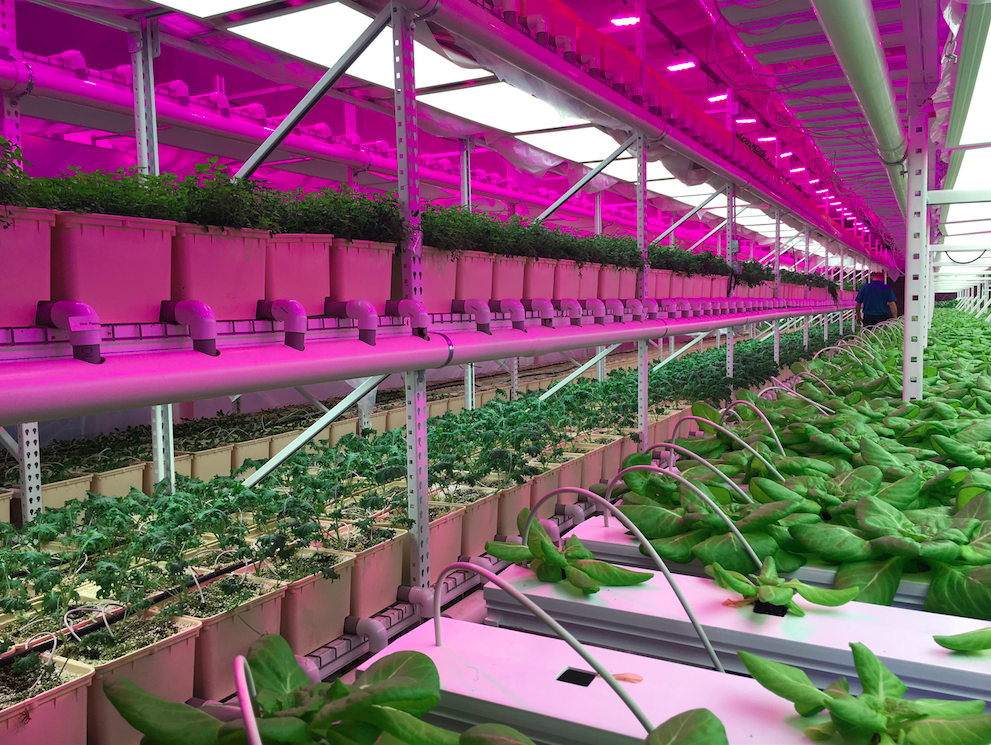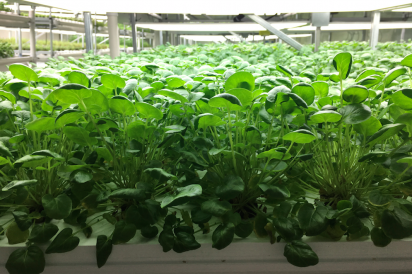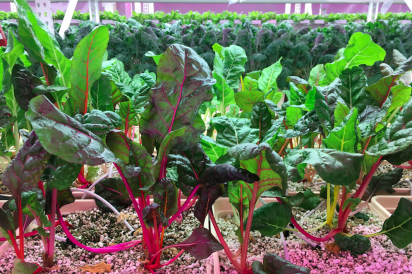Year-Round Farming
The first thing you notice when you walk into Farm 360, formerly Farm 365, is the pink glow. According to Farm Manager Jim Bloom, the energy-efficient LED lighting system, programmed to the optimal growing spectrum, is a key component of their indoor hydroponic farm located in Indianapolis’s east side Englewood neighborhood.
“Plants don’t like white light,” Bloom said, “Sixty percent of everything we grow uses blue light, then some like red and green light.”
Confronting Misconceptions
Lighting, it turns out, is just one of many misconceptions Bloom and his team have confronted as they learn the art and science of hydroponics. Plants floating in water is another. Hydroponics doesn’t use dirt or garden soil, but instead anchors crops in trays or buckets filled with a type of soil-like peat, or perlite.
The “hydro” aspect of hydroponics refers to continuously flowing water enriched with 14 different nutrients, which feeds the roots through the base of the tray or bucket. The water is tested and adjusted regularly for optimal plant nutrition, and because the water continuously recirculates, hydroponics uses 90 percent less water than outdoor farming.
Enhanced Growth Cycle
By optimizing these three components—light, growing media and nutrients—plants grown hydroponically mature to harvest in approximately a third of the time as conventional growing. Plus, the plants, vegetables and fruits grown at Farm 360 are highly nutritious, non-GMO, pesticide-free and soon to be classified as organic.
“There’s nothing abnormal about what we do. It’s just the natural process of the plants’ growth is getting enhanced,” Bloom said. “You don’t chemically manipulate; you environmentally and biologically manipulate it so the plant will actually enhance its growth cycle. The other thing is that the environment is stable so you get a consistency of plants.”
But achieving this optimal growing environment isn’t cheap, and hydroponic farming can’t compete in price with outdoor field farming without a few other unique features. For example, Farm 360 grows year-round. And with shorter growing cycles, they’re aiming for 14 turns, or 24-day growing rotations, per year. That beats the three outdoor harvests per year that are possible in sunny California. Farm 360 also has a six-month plan to max out their current facility to 25,000 square feet of growing space, which is stacked vertically in five layers. Currently, they grow in approximately 8,000 square feet. They’ll also add a 9,000-square-foot year-round greenhouse, allowing them to take advantage of natural sunlight, too. Finally, organizing growing rooms into monocrops, or crops with similar growing preferences, will allow conditions to be further optimized.
Not Your Typical Farmer
Despite the complex agricultural science behind hydroponic farming, Bloom didn’t come to Farm 360 from a farming background. Instead, drawing from his experience in vocational rehabilitation, he started the company as way to create jobs for people with what he calls historical background issues, like incarceration or substance abuse. He began researching hydroponics after reading about opportunities for increased food production in the Indy Metro Area. Now Bloom considers himself a farmer, and four of the company’s 14 employees were hired out of incarceration, according to Chris Arnold, general manager of Farm 360.
“We have a goal to hire 70 percent of our employees from the local community who could potentially walk or ride their bikes to work,” Arnold said.
Poised for Growth
Farm 360 is on the verge of big growth. They’ve developed a reliable, beta-tested system they could easily replicate and already are looking at two new Indy Metro facilities for possible expansion.
Also, they have a four-prong distribution plan. Currently, they sell most of their crops to local restaurants and do some retail business, but they have their sights on two additional outlets. Farm 360 is launching a pilot program with Indianapolis Public Schools to provide a portion of the romaine lettuce used in school lunches. They also hope to work with local hospitals to explore nutraceuticals, herbs and root plants prescribed for their medicinal qualities.
Really, it comes down to the bottom line for Farm 360, only in their case they have three.
“Ultimately, supplying fresh local foods to the people who matter the most is clearly a vision of ours,” Arnold said, “but we also talk about a triple bottom line: economic impact, social impact and, in our case it’s a spiritual impact that we’re really trying to focus on.”
“We think family farms unfortunately are going away, and we’d like to create neighborhood farms, community farms,” Bloom said. “This is something hopefully the community will rally around and will be an integral part of the community for years to come.”
What Grows Hydroponically?
While anything could be grown hydroponically, not all plants make sense economically. According to Bloom, the vertical stacking, LED lighting and quick crop turns influence crop choices. That means compact plants work best, particularly the leafiest that don’t need as much natural sun to help with fruiting. Farm 360 grows lots of herbs such as oregano, thyme, sage and basil, and greens such as arugula, kale, romaine and Bibb lettuce.
Soon, they’ll be introducing strawberries and other fruiting plants, especially with the addition of the greenhouse.
“Once we go to the greenhouse we’ll have other ways to grow, too, like trellises for Brussels sprouts,” Bloom said.
Farm 360 will also begin an integrated farming approach, using the supplemental space not otherwise filled in the growing rooms to produce crops with longer maturation periods or less compact vines or plants, like squashes, melons, beets, carrots and radishes.
“Every square inch of what we do will eventually have some type of crop growing in it,” Bloom said.
Crops you’ll probably never see in the Farm 360 lineup? Tree fruits—imagine those stacked five layers high; or commodity row crops like wheat, corn and soybeans that have yields measured by acre, not square foot; even root crops like potatoes, because of their long growing period.
How to Grow Your Own Hydroponic Garden
While I was visiting with Chris Arnold and Jim Bloom at Farm 360, I asked about how to set up my own hydroponic garden. Is it possible?
“I can say ‘yes, but,’” Bloom said. “People have to understand they can’t do it economically. If they were going to do a small garden in their home, they would do it because they believe in it. It’s labor intensive, and it’s costly. The only way hydroponics works from an economic standpoint is scaling it.”
Still, he said yes, so I asked for specifics. What would it take? Basically, a home hydroponic garden would need the same elements Farm 360 uses: grow lights, an irrigation system with nutrient-enriched water, a growing medium and seeds for growing.
Many online sites offer DIY hydroponic gardens using PVC pipe or recycled bottles. And not all hydroponic systems require artificial grow lights, depending on the natural lighting in your home. In fact, many hydroponic systems can even be used outside during warmer temperatures.
Bloom mentioned that many companies sell hydroponic systems suitable for small-scale home growing. Miracle-Gro offers self-contained Aerogardens that include all the necessary components for countertop hydroponic gardening, including LED lighting and seed pods to get you started. Prices for these factory-made systems vary greatly depending on size and features. Even the countertop Aerogardens can cost more than $400. Bloom urges people to know what they’re getting into with small-scale hydroponic gardening.
“The reality is, it cost $400 and you grew six plants. I mean, it’s cool as all get out, but you have to grow a whole lot of these [pointing to basil plants] to justify $400,” Bloom said.
Farm 360 | 201 S. Rural St. | Indianapolis | Farm360.info
Since going to print, Edible Indy has learned Jim Bloom is no longer with Farm 360. The partners of Farm 360 remain committed to their mission and vision to create sustaianble, healthy, local food production.









